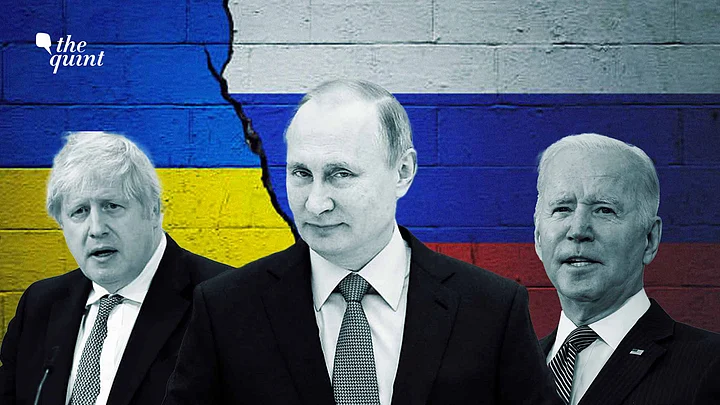Carl Von Clausewitz, the Prussian General and military theorist introduced the concept of “absolute war” where participants use every means at their disposal to achieve victory. As the Russian invasion of Ukraine enters its seventh day, much of what the world is witnessing reiterates Clausewitz’s theory of absolute war.
While the tanks, soldiers, aircraft, and missiles play a major role in the invasion, there is another war that has been unleashed where technology is not just a tool, but also the battleground.
Much of this was expected once social media emerged as a potent platform for not just networking, but also diplomacy and war. The Ukrainians, who are clearly outnumbered and outgunned militarily, took to social media to bring balance to this asymmetry to the on-ground war.
US Could Target Russian Web Domains
The Ukrainians were quick to push for a ban on all internet domains that have a .ru address. Part of the internet is administered by ICANN, a body based out of California, US, that also deals out domain names and internet addresses globally.
Not only does this give a massive advantage to the US, where the internet was born, it is now seen as a pressure tactic that could have a major impact on isolating Russia.
The chances of ICANN banning all Russian domains is far-fetched and even the Ukrainians knew that. But the fact that they raised it is ample evidence that “absolute war” could mean many things beyond the tanks, combat jets and infantrymen.
Computer Chips & China
Another major development that this war has witnessed is the quick ban by a US-led coalition on the import of computer chips. This is intended at the heart of the military-industrial complex that is critical to Russia’s ability to sustain a protracted war. Unlike the Cold War, where the erstwhile Soviet Union had an abundance of influence and resources through the Warsaw Pact, modern-day Russia has its limitations.
The revolution in military affairs, that started in the mid-1980s, ironically at a time when the Soviet Union was imploding, has led to greater automation fuelled by increasing computing power. Today’s battlefields are decided by algorithms and the speed at which smart munitions can be developed and with great precision.
All command-and-control systems are heavily computerised and increasingly vulnerable to cyberattacks. A ban in chips will have a major debilitating effect on the Russian war machine and economy.
While the US dominates chip design, innovation and R&D, Taiwan Semiconductor Manufacturing Company (TSMC) alone accounts for more than 90 percent of the chip-making. Britain, Germany, Japan, the Netherlands, and South Korea — collectively contribute 53 percent of value and 6 percent by China.
Russia purchases roughly 70 percent of its chip supplies from China but they are of low quality that can only be used in consumer products. The Russians will also be wary that this will push them further into the Chinese sphere of influence.
The SWIFT Network
The threats to also ban the Russians from the SWIFT network, a system that facilitates international electronic payments across borders, is another development that brings a new aspect to “absolute war”.
In the long run, the Russians will be forced to find and build alternatives along with allies such as China.
But in the short and mid-term, coupled with the other sanctions already in place, this will have a major impact on Russia’s economy. Sectors such as aviation are already witnessing Russian aircraft being banned from foreign skies.
Will an eventual ban on Russia from the SWIFT network also lead to a push for cryptocurrencies? This is a distinct possibility for Russia, which might pick up a few lessons from Iran, which has dealt with sanctions for a long time and to earn from its energy exports.
What is also of interest is the de-platforming of many Russian media outlets from social media platforms such as YouTube and Facebook, among others. Russia lacks the kind of “internal internet” that China managed to build behind its great firewall.
They don’t have a Weibo or WeChat, which have become major tools for not only networking but also financial transactions. But it is a matter of time before the Russians begin to push for a “Russian internet” that will allow its government greater control.
Splintering of the Internet
One of the major fallouts from this conflict seems to be a splintering of the internet, with more Chinese-like firewalls coming up in countries that are opposed to the US domination of the internet and internet-based technologies.
It will also, in all likelihood, lead to new power blocs, where technology and its raw materials are carved up in a bid to consolidate power, national security and global influence.
But will this mean that Russia will now depend on the Chinese for getting around the sanctions? In the immediate run, that seems unlikely.
The Chinese government would be hard-pressed to avoid attracting any sanctions, even as it grapples with the fallout of a trade war with the US. But in the long term, Russia and China will definitely emerge as the new power bloc in Cold War 2.0.
For a country like India, there are major lessons here. It will need to become a producer of the internet instead of just being a consumer.
That means building more technologies that can be used by both domestic and global users. It will also mean building alternatives to global digital payment networks so that it has redundancies to fall back on. Both Russia and Ukraine hold valuable lessons that will continue to redefine the rules of the new “absolute war”.
(Saikat Datta is a former journalist and Founding Partner, Deepstrat. Kazim Rizvi is the Founding Director of the thinktank, The Dialogue. This is an opinion piece and the views expressed above are the author’s own. The Quint neither endorses nor is responsible for the same.)
